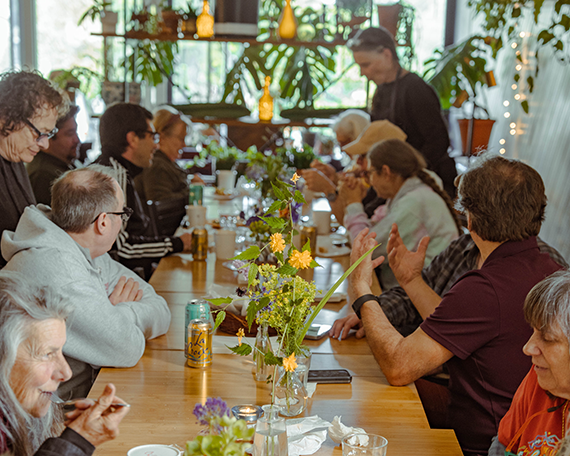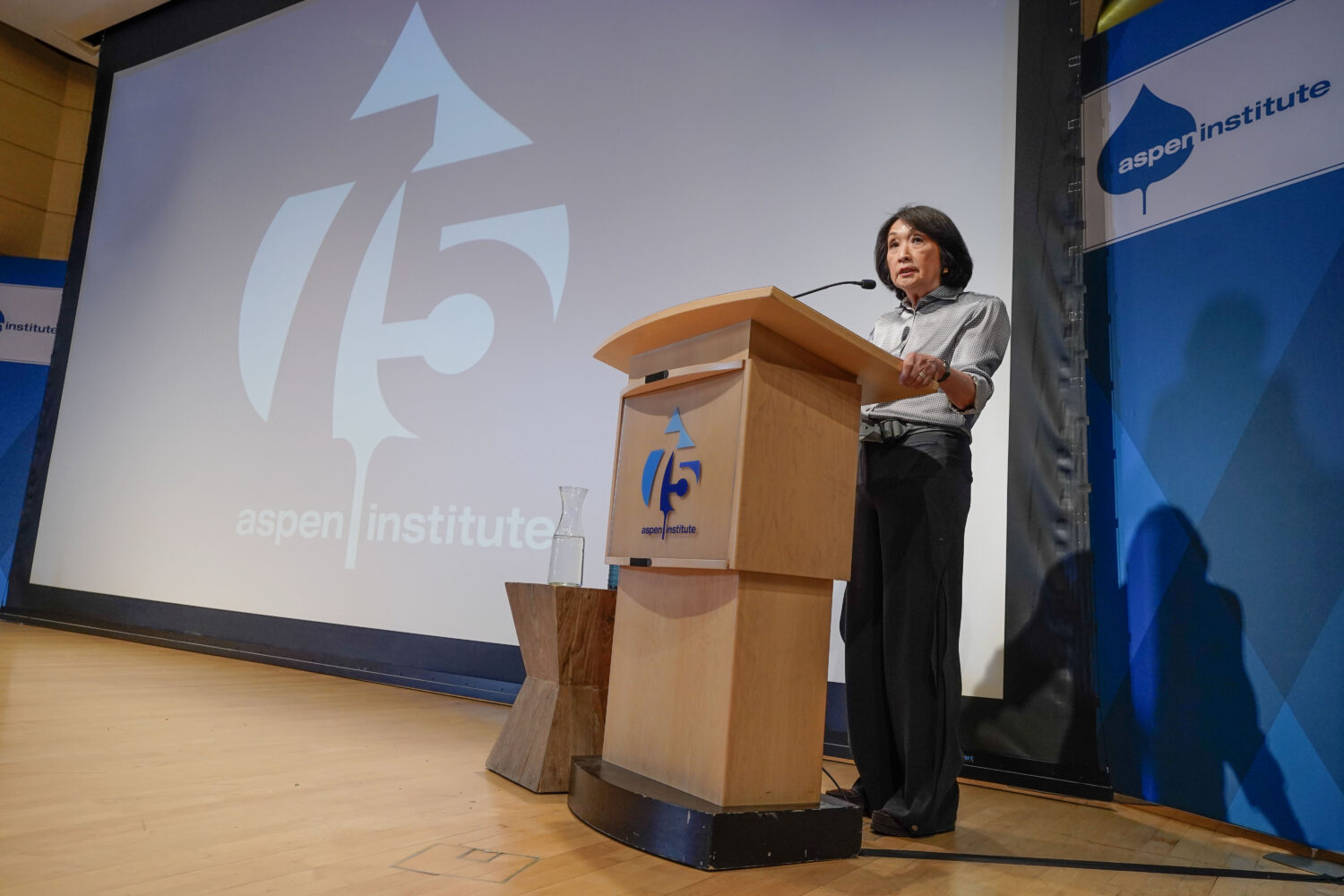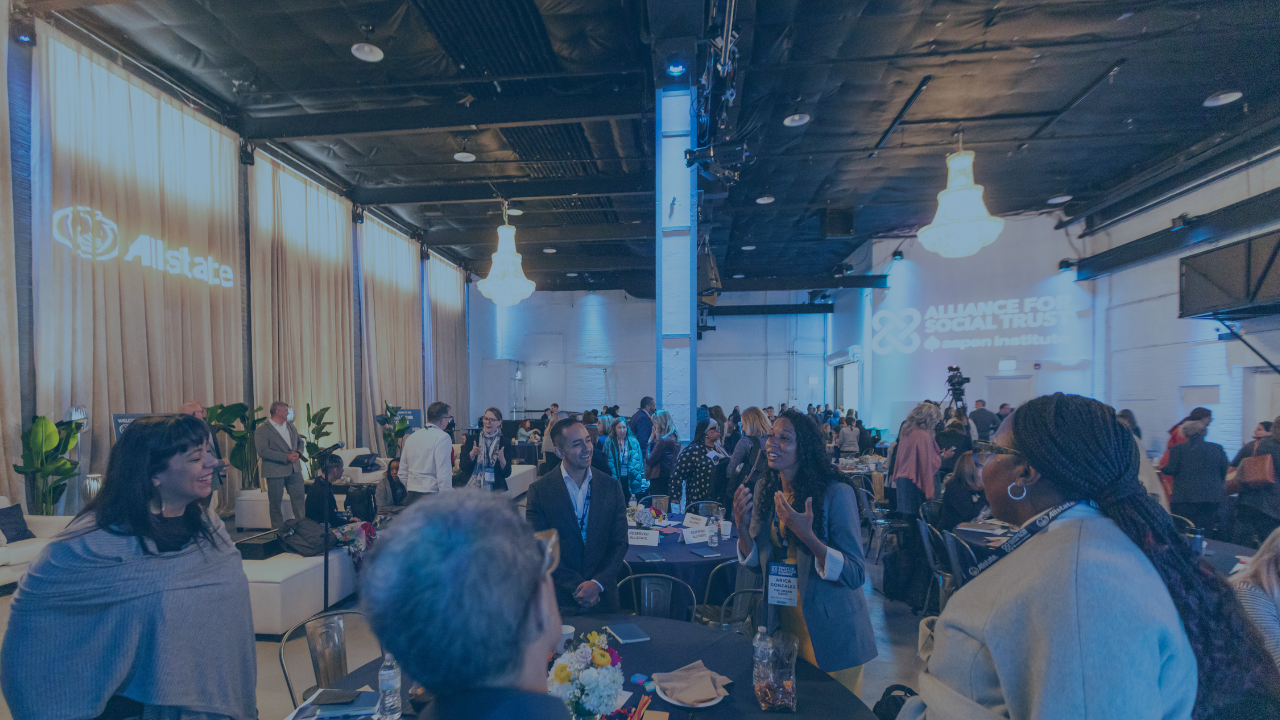How Good Jobs Support Small Business Success: Lessons from the Shared Success Demonstration
On May 21, the Aspen Institute’s Economic Opportunities Program hosted “How Good Jobs Support Small Business Success.” The event marked a key milestone in the Shared Success project, a multi-year demonstration launched in 2022. Through this effort, EOP has partnered with 11 community development financial institutions (CDFIs) across the country to integrate job quality strategies into small business services, helping businesses grow stronger while improving workplaces for their employees. At the convening, CDFIs, small business owners, evaluators, and workforce advocates gathered in Washington DC and online to reflect on what it takes to achieve “shared success,” where businesses and employees can thrive together.
Some of the quotes below have been lightly edited for clarity. Read the full transcript here.
Grounding Job Quality in Community, Culture, and Care
At a time when small businesses – often referred to as the backbone of our economy – face many challenges, this project has shed light on why job quality matters to them and highlighted innovative strategies to engage, support, and incentivize small businesses to improve job quality. The first panel, moderated by Lauren Starks, director of EOP’s Good Companies/Good Jobs Initiative, explored the value that small businesses see in investing in job quality and their experiences of working with CDFIs and their partners to improve the quality of jobs at their businesses. The panel also shared practical insights from the demonstration on how CDFIs could build a focus on job quality into their advising work.
For Eunice Straight Head, co-director of Oyate Studio on the Cheyenne River Reservation, and Laura Owens, who had worked closely with Oyate in partnership with Four Bands Community Fund, job quality begins with culture. They discussed examples of how they’ve created a motivating, safe, and inclusive environment at Oyate Studio and built in Lakota traditional values, noting how scheduling flexibility, for instance, has been informed by culture. “The Oyate team are all mothers,” said Straight Head, when asked how workers’ perspectives inform her company’s approach to job quality. “It’s graduation season for many of their families, and sometimes they need to take time off work. That can be challenging, but we always make sure to accommodate them because we understand the cultural significance of preparing a graduate, especially since a smaller percentage of Indigenous students graduate [compared to national averages]. We want to make sure that we’re contributing not only to our generation, but the next generation.”
Oyate Studio, which trains and employs Native American women to make artisanal products, is as much a space for cultural revitalization as it is for economic opportunity. The studio offers not just a paycheck, but healing, community, and intergenerational leadership. Laura Owens, chief of staff at vChief and consultant for Four Bands Community Fund — a CDFI participating in Shared Success — emphasized the need for responsive, flexible support in Oyate Studio’s rural contexts, where challenges like transportation and child care require creative solutions. “If someone isn’t showing up for work, it’s not because they’re sleeping in,” Owens said. “It’s because maybe their car broke and that is going to take a two-hour drive to go fix it, several days for the car to get fixed, several days for it to come back.”
Tristan Bredehoft, co-owner of Cafe Rica in Battle Creek, Michigan, shared how his experience in the food service industry, which is characterized by low wages and a toxic work culture, inspired him to create something better. With support from Northern Initiatives — a Michigan-based CDFI and Shared Success grantee — and the Good for Michigan program, Cafe Rica embedded job quality into its operations. One way Cafe Rica approaches job quality is by opening a line of communication. “We always ask our teammates when they first get in, ‘What are your goals outside of work, and how can we help you accomplish those?’” said Bredehoft. He continued, “Through the many years we’ve been in business, we’ve made multiple connections with different types of people, so we always try to connect [our employees] with those people.”
While open communication helps create a supportive culture, structure is equally important. Israel Flores, business services director at Northern Initiatives, reminded attendees that intentions aren’t enough — structure matters, and that’s what creates a consistent, supportive environment. he said “So you need to have [job descriptions and an employee handbook] in place in order to make sure that everybody follows the [same] policy and rules.”
Scaling What Works Through Alignment, Data, and Long-Term Partnerships
With millions of Americans working in low-quality jobs—characterized by low wages, unsafe conditions, and negative impacts on individual and family well-being—the crisis of job quality in the US demands urgent action to scale effective strategies that address these challenges. The second panel, moderated by Maureen Conway, a vice president at the Aspen Institute and executive director of EOP, explored how funders, intermediaries, and CDFIs can scale job quality across geographies and business types.
Viola Mai, director of development and impact at ICA Fund, another Shared Success grantee, outlined how job quality is both an investment strategy and a tool for due diligence in ICA’s equity portfolio. She said, “If [job quality] is something that is valued by the organization, it really has to be institutionalized.” Mai explains that when job quality is embedded in your organizational mission, you’re not just pitching a program — you’re inviting funders into your values.
Betsy Biemann — a Job Quality Fellow and CEO of Shared Success grantee Coastal Enterprises, Inc. (CEI), — echoed the importance of long-term relationships, and also noted the value of research and evidence to build support for the work. CEI has embedded job quality across its small business advising, lending, and venture portfolio, using program-related investments from funders to support and evaluate impact. Biemann shared early evidence that businesses focused on job quality are outperforming their peers. In CEI’s venture portfolio, companies that either have higher quality jobs or have been making improvements in their jobs are seeing faster growth. “It’s correlation, not necessarily causation,” she said, “but it’s promising.”
Barbara Magnoni, president of EA Consultants, shared preliminary findings from the Shared Success midpoint evaluation, a survey of 158 businesses across the 11 CDFIs participating in the demonstration:
- 92% reported making job quality improvements; and
- 84% reported positive business outcomes, including better retention and productivity.
These numbers are early findings, but they indicate that CDFIs can make a difference in how their small business clients design jobs and that improving job quality can contribute to business success.
Shared Success, Shared Momentum
Across both panels, a common theme emerged: job quality is a set of values embedded in practice. From the hyperlocal to the national, Shared Success highlights how advancing job quality in small businesses is not only possible — it’s already happening. What we’ve seen through the Shared Success initiative is that small businesses can make meaningful improvements to job quality—and when they do, it’s not just good for workers, it’s good for business. CDFIs have demonstrated they can play a vital role in helping business owners take important steps to improve job quality. And as panelists made clear, continued progress will require deeper partnerships, stronger data and research, a willingness to reexamine assumptions about what makes a good job and what is good business, and a shared commitment to building an economy in which everyone has the opportunity to thrive.
Related Resources
Catch up on everything from the event with the full recording, highlight clips, transcript, and all the resources shared.
About Shared Success

Shared Success is a project of the Economic Opportunities Program, works with community lenders to integrate job quality programming into their small business support services, demonstrating that improved job quality can support the needs of employees while helping small businesses succeed.
About the Economic Opportunities Program

The Aspen Institute Economic Opportunities Program hosts a variety of discussions to advance strategies, policies, and ideas to help low- and moderate-income people thrive in a changing economy. To learn about upcoming events and webinars, join our mailing list and follow us on social media.








